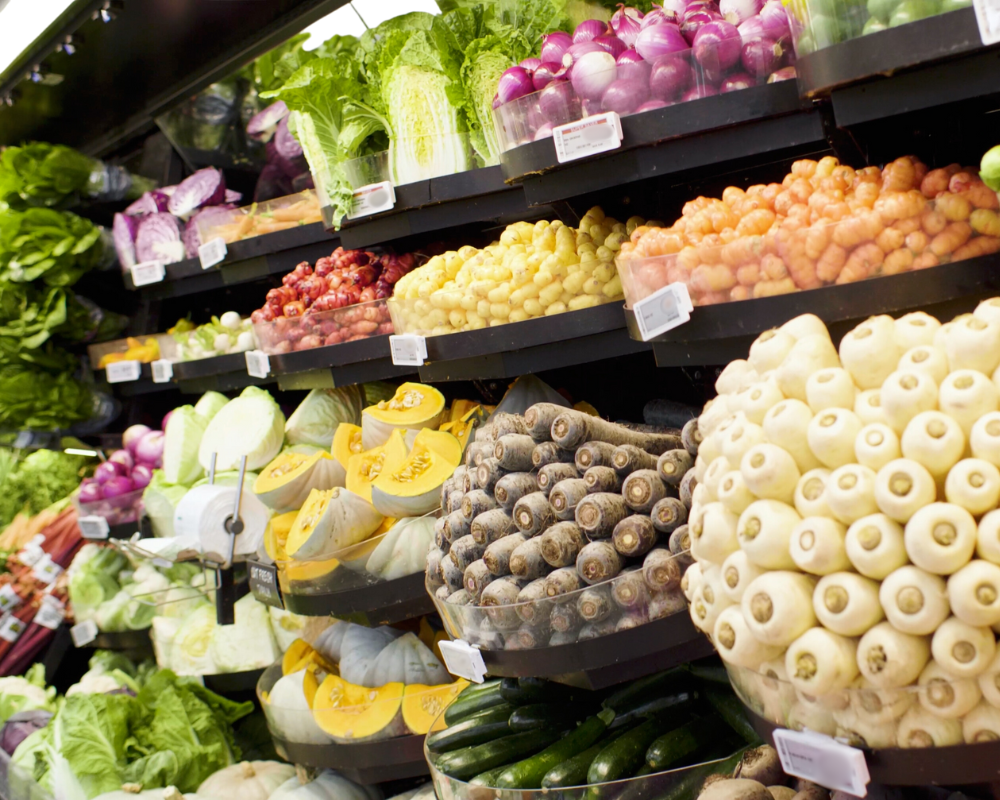Foodstuffs co-ops welcome no rise in retail prices in their FPI basket in March year-on-year
12 April 2024

- Stats NZ records 0.7% increase for its food price index basket in the year to March 2024
- Foodstuffs co-ops record no increase in price of items from the same categories in March YoY
- Double-digit decreases at Foodstuffs stores include lamb leg roasts and orange kūmara YoY
The Foodstuffs grocery co-ops say latest price data shows more good news for customers in the fight to bring inflation down and deliver value at the checkout, after recording no increase in its basket of goods used to measure food inflation in March 2024, year-on-year.
While Stats NZ today reported food inflation of 0.7% in the year to March 2024 – based on changes in the prices households pay for a representative basket of foods – the two Foodstuffs co-ops recorded a -0.1% rate year-on-year on goods in their representative basket across the same categories, on average across their stores.
For the last 23 months, the Foodstuffs co-ops have compared data for food prices across their 500+ stores with the same categories in Stats NZ’s ‘food group’ basket, used to calculate the food price index, or FPI.
In that time, the price of the Foodstuffs co-ops’ national basket has almost always grown at a slower pace than Stats NZ’s, and in the latest month, March 2024, was actually down -0.1% compared to March 2023.
Chris Quin, Foodstuffs NZ’s Managing Director, says the result is testament to the hard work of the two co-ops’ 500+ local owner-operators to rein in food prices since inflation took off in 2022.
“This is a big achievement in our drive to do what we can to keep food prices lower for New Zealanders, after the record inflation of the past two years,” says Quin. “It’s been the toughest inflation fight many of our current generation of local grocers have experienced, and they know there’s more work to do.”
“Now we need to step up to the challenge from customers to deliver even more value and innovation. Which is a key reason we’re now looking to merge into one national Foodstuffs co-op, so we can bring even better value at the checkout.”
Produce’s post-cyclone recovery lead prices lower
Helping the co-ops’ efforts to keep food prices stable in comparison with March last year was a -16.2% average decrease in the price of the same fruit and vegetable categories included in Stats NZ’s basket. Produce again dominated the co-ops’ top 10 biggest year-on-year decreases – but not entirely, with lamb leg roast prices down by one-third, year-on-year, reflecting the timing of Easter this year, as shown below:
|
Item |
YoY change (Mar 2024) |
Item |
YoY change (Mar 2024) |
|
Tomatoes |
↓50% |
Beans (green round) |
↓38% |
|
Avocadoes (NZ) |
↓48% |
Cabbage (green) |
↓35% |
|
Lettuce |
↓47% |
Lamb leg roast |
↓32% |
|
Celery |
↓46% |
Courgettes |
↓30% |
|
Kūmara (orange) |
↓45% |
Onions (brown) |
↓24% |
Quin says many of the double-digit price falls for produce were the result of growers recovering from the crop devastation caused by last year’s cyclones.
“It’s a complex task ensuring all stakeholders benefit from a lower cost of living,” Quin says. “But it’s something we’re always aware of, and when it comes to our proposed merger, both co-op Boards are clear that benefits must flow through to all stakeholders, whether customers, suppliers, owners or staff.”
Supplier cost increases continue downward trend.
The rate at which Foodstuffs’ suppliers are lifting the cost of their goods continues to slow but is still higher than retail price increases – suggesting the battle against food inflation isn’t over yet.
In March, the co-ops’ recorded a 3.3% year-on-year increase in what suppliers charged for the same goods in Stats NZ’s food basket, while the Infometrics-Foodstuffs Grocery Supplier Cost Index (GSCI) showed an average 3.2% YoY increase in the list cost suppliers charged across a wider set of over 60,000 products.
“Fuel prices have crept up since the start of the year, and prices for some food commodities too, including many vegetable oils,” says Quin. “So while this month’s result for retail prices is something to celebrate, our grocers will be staying laser focussed on delivering great value at the checkout, especially as we’re very conscious that current economic conditions are impacting many New Zealanders.”
